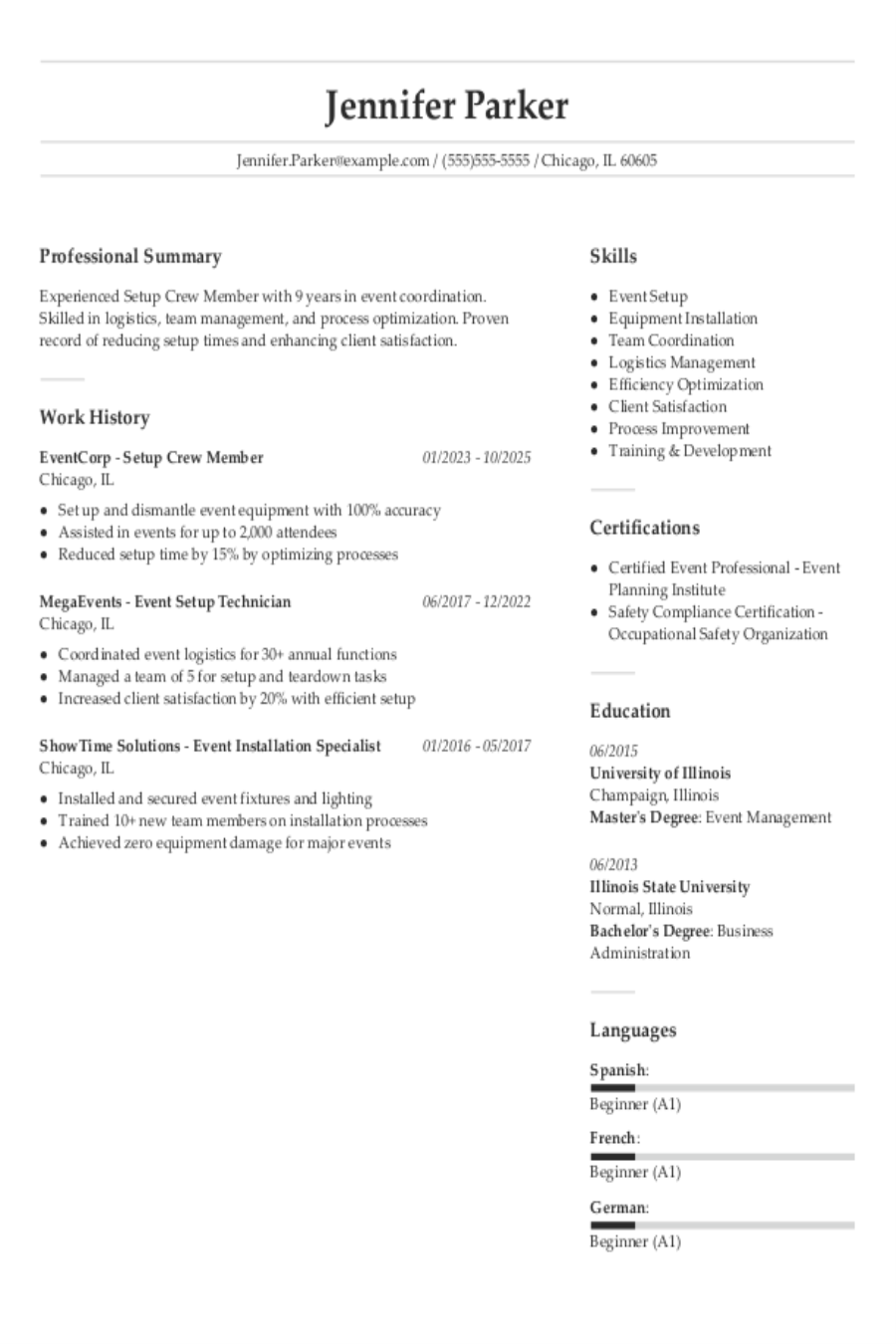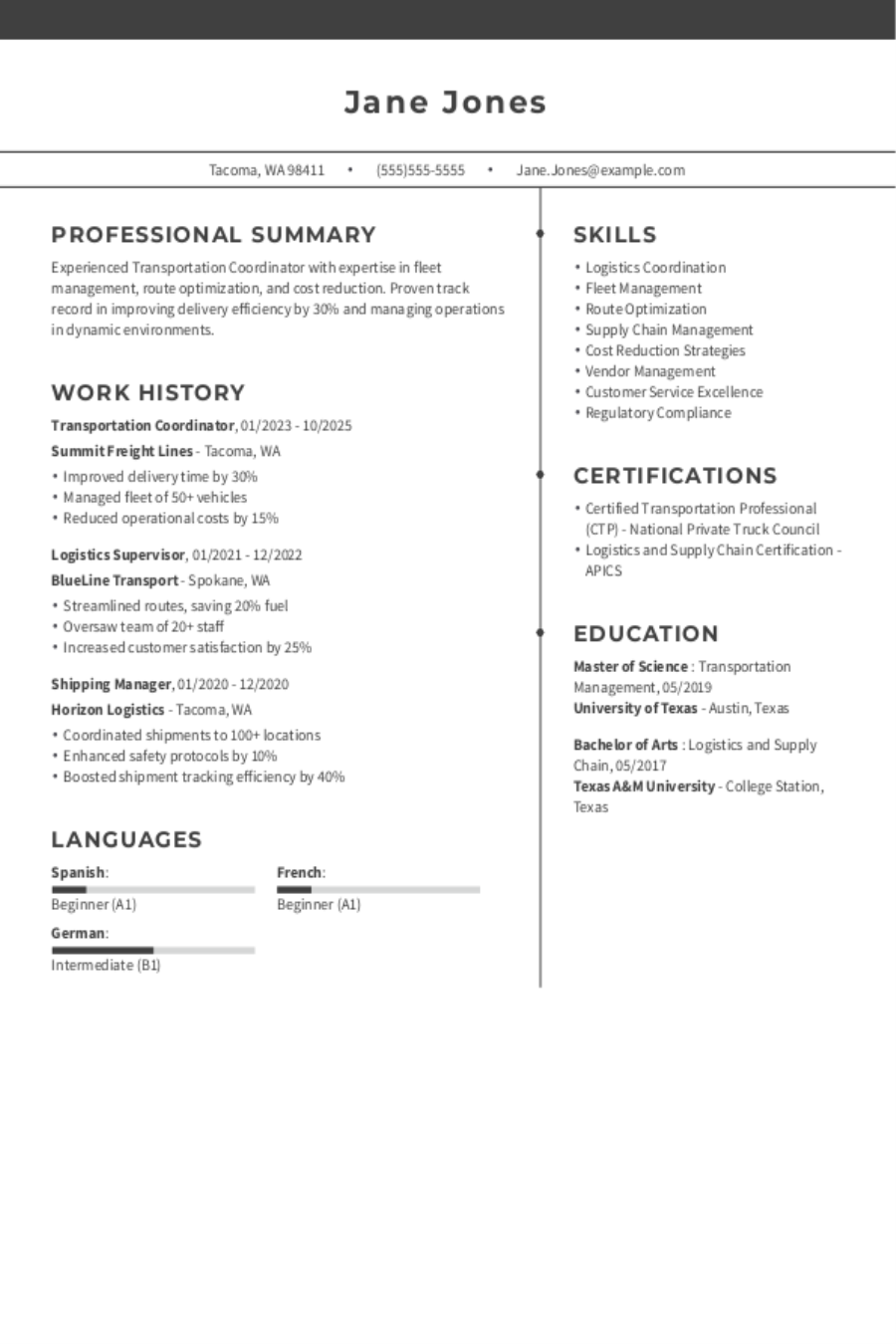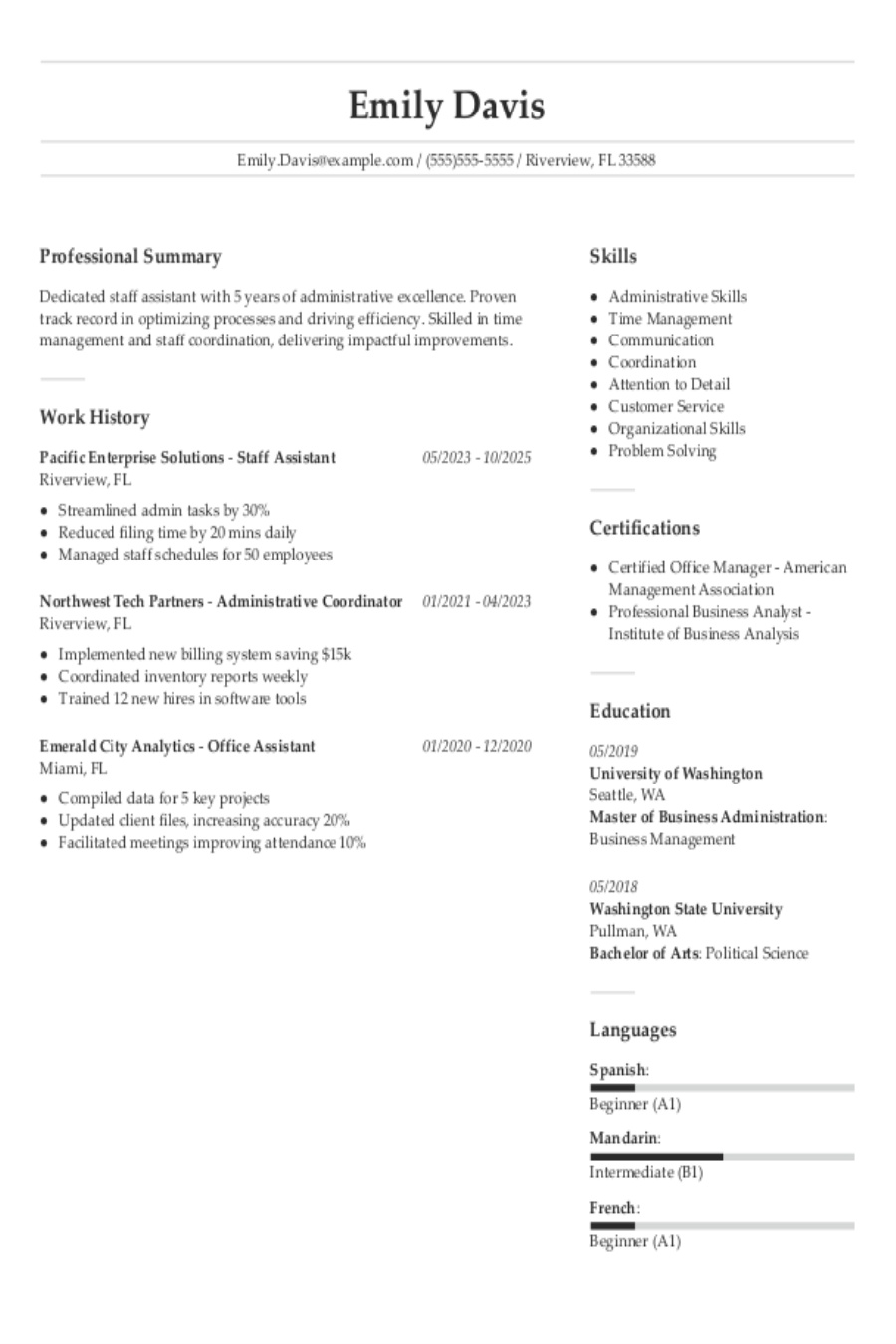Popular Operating Room Nurse Resume Examples
Entry-level operating room nurse resume
An entry-level resume for an operating room nurse should focus on clinical rotations, relevant certifications, teamwork skills, and a strong commitment to patient care to show readiness for the role.
Emphasizes soft skills: This resume highlights the job seeker's strong soft skills in teamwork and communication, which are important in high-pressure operating room settings. For example, their coordination with surgeons to improve patient care demonstrates their ability to thrive despite limited experience.
Places skills over experience: Using a functional resume format strategically highlights this candidate's surgical assistance and patient care management skills, showcasing critical contributions rather than focusing solely on limited experience.
Mid-career operating room nurse resume
A mid-career operating room nurse resume should showcase a combination of clinical expertise, teamwork skills, and continued education to reflect professional growth and adaptability in a fast-paced environment.
Employs active language: Strong action verbs like "implemented," "trained," and "oversaw" highlight initiative and strong contributions, showcasing a commitment to excellence in patient care.
Balances skills and experience: This applicant's resume effectively highlights their technical expertise in surgical nursing while showcasing a clear trajectory of career advancement, from preoperative nurse to operating room nurse, reflecting professional growth and dedication.
Experienced operating room nurse resume
An experienced operating room nurse resume should emphasize clinical skills, key achievements, and relevant certifications to effectively illustrate the applicant's professional growth and expertise in surgical settings.
Optimized for ATS: The resume showcases a polished template that merges a professional header with an ATS-friendly resume layout, effectively appealing to both human recruiters and automated systems through its clarity and organization.
Embraces modern design: This modern resume template effectively highlights the job seeker's expertise as an operating room nurse, focusing on their dedication to patient safety and innovative methods in high-pressure surgical settings.
No experience operating room nurse resume
A resume for an applicant with no experience should highlight relevant clinical skills, certifications, and any volunteer work to showcase their preparedness and commitment to patient care in a surgical environment.
Uses a simple style: The resume’s clear layout effectively highlights qualifications and experiences, allowing the focus to remain on relevant skills for a nursing role without unnecessary clutter.
Overcomes lacking experience: Including extracurricular activities and volunteer work in a resume not only highlights personal initiative and teamwork but also shows valuable skills for the operating room nursing field.
More resume examples
Additional Guides
- Licensed Practical Nurse
- Medical Surgery Nurse
- Neonatal Intensive Care Nurse
- New Grad Nurse
- Nurse Manager
- Nurse Midwife
- Nurse Practitioner
- Nurse Supervisor
- Occupational Health Nurse
- Oncology Nurse
- Pediatric Nurse
- Perioperative Nurse
- Post Anesthesia Nurse
- Progressive Care Nurse
- Registered Nurse
- RN Unit Manager
- School Nurse
- Student
- Travel Nurse
- Utilization Review Manager
Operating Room Nurse Resume Template
Looking to craft a standout application? Use this operating room nurse resume template as your base—simply personalize it with your unique details and experiences.
John Johnson
San Francisco, CA 94104
(555)555-5555
John.Johnson@example.com
Professional Summary
Dedicated Operating Room Nurse with 9 years of experience. Proven track record in managing surgical procedures, improving patient recovery outcomes, and collaborating effectively with medical teams.
Work History
Operating Room Nurse
Harmony Health Center - San Francisco, CA
March 2023 - October 2025
- Managed 20+ surgical procedures weekly
- Reduced patient recovery time by 15%
- Assisted in training 10 new team members
Surgical Nurse
Riverside Medical Group - Lakeside, CA
February 2017 - February 2023
- Prepared and sterilized surgical equipment
- Conducted pre-operative assessments for 100+ patients monthly
- Improved compliance with surgical protocols by 20%
Post-Anesthesia Care Unit Nurse
Greenfield Hospital - Los Angeles, CA
January 2016 - January 2017
- Monitored vital signs of patients post-surgery
- Administered pain management to 50+ patients weekly
- Collaborated with surgical teams for patient care plans
Skills
- Patient Care
- Surgical Assistance
- Sterilization Techniques
- Pre-Operative Assessment
- Post-Operative Care
- Pain Management
- Team Collaboration
- Compliance Improvement
Education
MSN Nursing
City University Metropolis, NY
June 2016
BSN Nursing
State College Hometown, CA
June 2014
Certifications
- Certified Perioperative Nurse (CNOR) - Competency & Credentialing Institute
- Advanced Cardiac Life Support (ACLS) - American Heart Association
- Basic Life Support (BLS) - American Red Cross
Languages
- Spanish - Beginner (A1)
- French - Intermediate (B1)
- Italian - Beginner (A1)
Writing Your Operating Room Nurse Resume
Having explored exemplary resumes, you're now prepared to delve into the specifics of how to write a resume. We'll walk you through each section methodically, ensuring you create a standout document that effectively showcases your skills and experience.
List your most relevant skills
An effective skills section for an operating room nurse resume should highlight both your technical abilities, such as skill in surgical procedures and patient monitoring, and essential soft skills like teamwork and communication. This approach ensures you present a well-rounded picture of what you bring to the role.
To make your skills stand out, carefully analyze job listings for keywords from the job listing relevant to the position. Incorporating these keywords will not only resonate with human recruiters but also improve your chances of passing applicant tracking systems.
Example of skills on an operating room nurse resume
- Proficient in assisting with surgical procedures and maintaining sterile environments
- Skilled in monitoring patient vitals and responding to changes during operations
- Strong communicator with the ability to collaborate effectively with surgical teams
- Compassionate caregiver dedicated to ensuring patient comfort and safety
A strong skills section is essential for demonstrating your job readiness as an operating room nurse. It should highlight key technical skills from the job description, such as surgical assistance and patient monitoring, alongside important soft skills like teamwork and effective communication. This combination showcases your comprehensive ability to meet the demands of this critical role.
Highlight your work history
Crafting an effective work experience section should showcase specific examples of how you contributed to patient care and surgical outcomes, ensuring that your entries are rich in relevant keywords.
For each job entry, include important information such as your title, the name of the healthcare facility, and the dates you worked there. This information helps employers quickly assess your background and establish your credibility as a professional. Be sure to emphasize any certifications or specialized training that improve your qualifications.
Example of an operating room nurse work experience entry
- Operating Room Nurse
Health First Hospital - Orlando, FL
January 2019 - Present - Assist in over 300 surgical procedures annually while maintaining a sterile environment and ensuring patient safety
- Monitor patients' vital signs and respond swiftly to changes during surgeries, contributing to a 98% patient satisfaction score
- Collaborate with surgeons and surgical teams to optimize operational efficiency and improve workflow, reducing procedure times by 15%
- Educate patients and families about post-operative care, improving recovery outcomes and facilitating a smooth transition home
- Mentor new nursing staff on best practices and hospital protocols, improving team performance metrics by 20%
Aim for clarity in your bullet points by focusing on specific achievements. Highlight the impact of your contributions succinctly, using action verbs to convey results without unnecessary details.
Include your education
The education section of your operating room nurse resume should clearly display your academic credentials in reverse-chronological order starting with your most recent degree. Include relevant nursing diplomas and degrees while omitting your high school diploma if you hold a higher qualification such as a bachelor's degree or an associate's degree in nursing.
For those currently pursuing their education or having incomplete degrees, it's important to list your highest completed level alongside an expected graduation date. Including bullet points that highlight relevant coursework or specific clinical experiences can be beneficial for recent graduates or current students looking to showcase their educational accomplishments and preparedness for the role.
Common certifications for an operating room nurse resume
- Certified Nurse Operating Room (CNOR) – Competency & Credentialing Institute (CCI)
- Registered Nurse First Assistant (RNFA) – American Nurses Credentialing Center (ANCC)
- Basic Life Support (BLS) – American Heart Association (AHA)
- Advanced Cardiovascular Life Support (ACLS) – American Heart Association (AHA)
Sum up your resume with an introduction
Creating a strong profile section in your resume is important for making a lasting first impression. Your profile serves as an introduction that summarizes your skills, experiences, and professional identity, allowing hiring managers to quickly gauge your qualifications and fit for the operating room nurse role.
If you have substantial experience in nursing, consider using a professional summary. This format allows you to highlight significant achievements and skills relevant to operating room nursing, showcasing why you are an ideal applicant for the position. If you’re just starting out, write a resume objective that highlights your commitment to building your career.
Professional summary example
Compassionate operating room nurse with over 5 years of experience in high-stakes surgical environments. Demonstrated excellence in patient care, collaborating effectively with surgeons and healthcare teams to ensure optimal outcomes. Skilled in managing anesthesia protocols and maintaining sterile fields, contributing to overall operational efficiency and patient safety.
Resume objective example
Compassionate operating room nurse eager to bring strong attention to detail and effective communication skills to a collaborative surgical team. Dedicated to ensuring patient safety and improving the overall surgical experience, while continuously expanding knowledge in perioperative care.
As an operating room nurse job seeker, it's essential to keep your resume profile concise yet packed with key information. Aim for no more than three sentences that highlight your most critical qualifications and experiences. You can elaborate on any additional details in your cover letter, allowing you to present a complete picture of your expertise.
Add unique sections to set you apart
Optional resume sections for operating room nurses allow you to highlight your unique qualifications and experiences beyond standard duties. These sections can be a great way to set yourself apart from other job seekers.
Incorporating relevant hobbies or volunteer work showcases not only your professional skills but also your personal values. For instance, if you participate in community health initiatives or have interests that improve your nursing capabilities, it's worth mentioning. This additional information helps employers see the well-rounded individual behind the skills and certifications, giving them a fuller picture of who you are as a applicant.
Three sections perfect for a operating room nurse resume
- Languages: As an operating room nurse, clear communication is important. If you are fluent in multiple languages, highlight these language skills on your resume to improve patient care and teamwork in diverse environments.
- Volunteer Work: Including volunteer work on a resume showcases your dedication to helping others and highlights valuable skills gained outside of traditional employment. It’s a powerful way to demonstrate your commitment to both your profession and the community.
- Accomplishments: As an operating room nurse, quantifiable accomplishments are vital for demonstrating your effectiveness in critical situations. Include these achievements in your job descriptions or create an accomplishments section to spotlight them.
5 Resume Formatting Tips
- Choose a format that matches your career stage.
Choosing the right resume format is important for showcasing your skills effectively. If you are an experienced operating room nurse, a chronological format highlights your career progression. For those just starting out, a functional resume can emphasize relevant skills over work history. Consider a combination format if you have both experience and skills to showcase.
- Pick a smart resume template.
Using a professional resume template can significantly improve the readability of your application. A well-structured layout helps potential employers quickly understand your qualifications. Choosing an ATS-friendly format ensures that hiring systems can easily parse your resume, boosting your chances of advancing past the initial screening phase.
- Select an appropriate font.
Opt for a clear and professional font to improve your resume's readability. Fonts such as Arial, Calibri, or Verdana are excellent choices that appeal to both ATS systems and hiring managers.
- Use consistent formatting.
Ensure your resume features a clean, left-aligned layout with uniform margins to create a polished and professional look that stands out to employers.
- Keep your resume to one or two pages.
When crafting your resume, remember that resumes should be one page long. If you have extensive experience, a two-page resume can be acceptable, but ensure every word counts and highlights your key qualifications and achievements.
Tools for Your Job Search
Are you preparing to apply for that operating room nurse position you've been targeting? Before you submit your application, make sure to use our ATS Resume Checker. This essential tool provides insights into how well your resume will fare against the automated systems used by many healthcare facilities during their initial screening processes.
Looking to elevate your resume further? Our AI Resume Builder assists with tailored recommendations specific to your nursing background, complemented by professional templates designed to highlight your surgical skills and experiences effectively.
Frequently Asked Questions
Last Updated: October 29, 2025
Absolutely. A cover letter is important because it adds depth to your resume and establishes a connection with potential employers. It allows you to express your passion for the operating room nurse role and highlight how your unique experiences make you an ideal applicant. So, don’t hesitate—write a cover letter that showcases your enthusiasm and qualifications.
For a quick and efficient solution, try our AI Cover Letter Generator! It helps you create customized, job-winning cover letters in just minutes. Plus, you can choose from various cover letter template options that perfectly match your resume, ensuring a professional look throughout your application materials.
A resume is typically a concise document that spans one to two pages, focusing on your relevant work experience and skills. In contrast, a CV (curriculum vitae) can be several pages long and provides comprehensive details about your academic background, research contributions, publications, and extensive professional experiences.
You’ll generally need a CV for roles in academia, science, law, or specialized medical positions. When it’s time to create your CV, our online CV Maker offers an efficient solution. With various CV templates tailored to different industries and career levels at your fingertips, you can craft a professional CV quickly and easily.
To write a strong CV, focus on structuring your information with clear headings such as education, work experience, and skills. Choose templates that are professional and compatible with applicant tracking systems (ATS). Tailor your content for each job application by incorporating relevant keywords from the job description to increase your chances of standing out.
Additionally, seeking inspiration from CV examples shared by industry professionals can provide valuable insights. Review how successful job seekers showcase their skills and experiences effectively. This will help you refine your own presentation and ensure you highlight what makes you an ideal fit for the role.
A frequent resume mistake operating room nurses make is submitting documents that ATS systems can't read. To avoid this, ensure your resume template is ATS-friendly by using standard fonts and avoiding images. Also, tailor your content to align closely with the job description to improve your chances of being noticed.
Absolutely, essential skills like "patient care" and "surgical assistance" are important on operating room nurse resumes. Be sure to check job descriptions for further important keywords and phrases that employers prioritize.
An active LinkedIn presence is important for operating room nurses seeking new opportunities. It helps you connect with peers, share your expertise, and highlight your skills in a competitive job market.
Was this information helpful? Let us know!
Hailey is a career advice writer dedicated to helping job seekers excel in their careers.
More resources

How to Include Research Skills on a Resume: 40+ Examples
Check out our guide to understand what research skills are and...

How To Write a CV: The Ultimate Guide for 2025
Here is a complete and comprehensive guide to writing a CV ev...

How to List Excel Skills on Your Resume (40+ Examples, Definition & Tips to Improve)
Learn how to list Excel skills on your resume with our guide f...

Event Setup Resume: Examples, Templates & Tips for 2025
Excited about diving into a dynamic new position in event setu...



